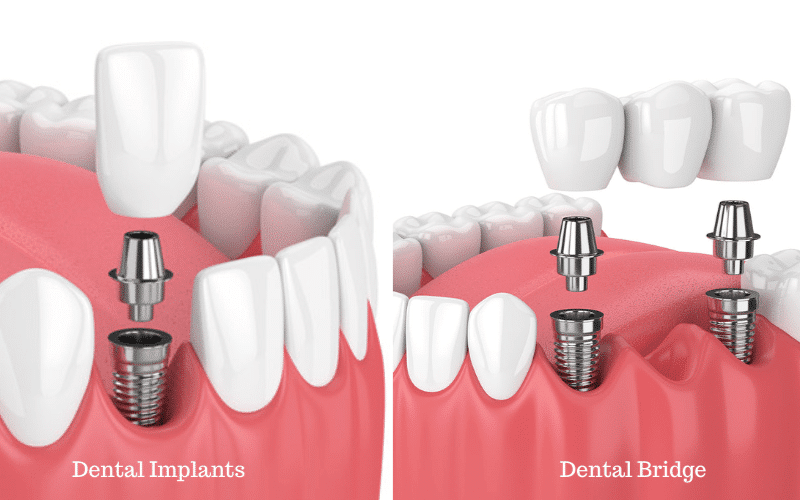
How Long Do Dental Implants Last?
Dental implants have revolutionized dentistry, offering a permanent solution to tooth loss beyond traditional dentures or bridges. For those considering dental implants in Glendale, understanding their longevity is crucial. A beacon of hope for those grappling with missing teeth, dental implants provide not only aesthetic benefits but also contribute to improved oral health.
In this comprehensive guide, we’ll delve into the factors influencing the lifespan of dental implants, exploring the expertise of an implant dentist in Glendale to shed light on the journey toward a lasting, confident smile.
Signs That You Need Dental Implants
- Persistent Toothache: Unrelenting tooth pain can clearly indicate something is amiss. Persistent toothaches should not be ignored, whether caused by decay, infection, or trauma. Dental implants in Glendale offer a long-term solution by replacing damaged or missing teeth and addressing the root cause of the discomfort.
- Gaps in Your Smile: A noticeable gap in your smile can affect your confidence and oral functionality. Dental implants seamlessly fill these gaps, restoring the natural appearance of your teeth and preventing potential shifts in the alignment of surrounding teeth.
- Difficulty Chewing and Speaking: If you find yourself struggling to chew food or enunciate words due to missing or damaged teeth, it’s time to consider dental implants. These implants provide stability and functionality, allowing you to enjoy a diverse range of foods and confidently speak.
- Loose or Shifting Teeth: Teeth that are loose or shifting can be a sign of underlying dental issues. Dental implants in Glendale act as sturdy anchors, preventing the movement of neighboring teeth and maintaining the integrity of your dental arch.
- Deteriorating Jawbone Density: Missing teeth contribute to the deterioration of jawbone density over time. Dental implants stimulate the jawbone, mimicking the natural function of tooth roots and preventing further bone loss. This not only enhances the stability of the implant but also promotes overall oral health.
How Long Do Dental Implants Last?
The durability of dental implants is a common inquiry, and rightly so. Patients investing in this transformative dental procedure understandably want assurance about its longevity. On average, dental implants have an impressive lifespan ranging from 15 to 25 years and often even longer. However, it’s crucial to note that individual experiences may vary. Numerous factors play a pivotal role in determining how long dental implants last.
Factors Influencing Dental Implant Longevity
Implant Placement Quality
The expertise of the implant dentist in Glendale is a critical determinant. A well-placed implant by a skilled professional significantly enhances its chances of longevity. Precision in placement ensures proper fusion with the jawbone, a process known as osseointegration.
Oral Hygiene Practices
Maintenance is key. Just like natural teeth, dental implants demand regular oral care. Patients must adhere to a diligent oral hygiene routine, including brushing, flossing, and regular dental checkups. This prevents issues like gum disease that could compromise implant health.
Overall Health Of The Patient
The general health of the individual also influences implant longevity. Conditions like diabetes or habits such as smoking can impact the body’s ability to heal and may consequently affect the success of dental implant integration.
Material Quality
The materials used in dental implants have evolved over the years. High-quality materials, such as titanium, are commonly used due to their biocompatibility and durability. Consult with your implant dentist to ensure that top-notch materials are being utilized.
Proper Aftercare
Post-surgery care is vital. Patients must follow the aftercare instructions provided by their implant dentist meticulously. This includes adhering to dietary restrictions, avoiding tobacco, and attending follow-up appointments for assessment.
Bone Density And Quantity
The foundation of dental implants lies in the jawbone. Sufficient bone density and quantity are crucial for the success of the implant. In cases of inadequate bone structure, the implant dentist may recommend additional procedures like bone grafting.
Regular Dental Checkups
Regular checkups are not only for natural teeth but also for dental implants. Routine examinations allow the dentist to detect any potential issues early on, enabling prompt intervention and preservation of the implant.
In dental restorations, implants stand as a beacon of innovation and durability. The journey towards a lasting, confident smile involves collaboration between the patient and their implant dentist in Glendale. While the average lifespan of dental implants is impressive, individual commitment to oral health, coupled with the expertise of a skilled professional, can extend their longevity. As you embark on the transformative path of dental implants, remember that a radiant smile is not just about appearance but also the enduring strength of a well-maintained oral foundation.



